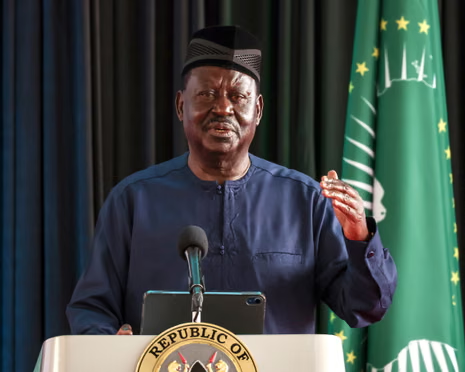Veteran Leader Passes Away in India After Cardiac Arrest
Former Kenyan Prime Minister Raila Odinga, a towering figure in the nation’s political history and often hailed as the “father of Kenya’s democracy,” has passed away at the age of 80.
According to family sources, Odinga died on Wednesday morning in India, where he had been receiving medical treatment.
Reports indicate that he collapsed during a morning walk and was rushed to Devamatha Hospital, where doctors confirmed he had suffered a cardiac arrest. Despite extensive resuscitation efforts, he was pronounced dead at 09:52 local time (04:22 GMT).
In recent weeks, speculation about his health had circulated widely, but family members had dismissed claims that he was critically ill.
Kenya Declares Seven Days of Mourning

President William Ruto led the nation in mourning, describing Odinga as a “beacon of courage and the father of our democracy.”
“Raila Amolo Odinga was a once-in-a-generation leader whose ideals transcended politics and whose legacy will shape Kenya for generations to come,” Ruto said during a televised national address.
President Ruto announced a seven-day period of national mourning and confirmed that Odinga would be given a state funeral with full military honours. Kenya’s flag will fly at half-mast across all public buildings and diplomatic missions during the mourning period.
Tributes Pour in from Around the World

Condolences have poured in from across Africa and beyond.
Indian Prime Minister m called Odinga a “towering statesman and cherished friend of India,” highlighting his contribution to strengthening ties between Nairobi and New Delhi.
South African President Cyril Ramaphosa praised Odinga as “a leader who always put his country and continent first,” while Zambia’s Hakainde Hichilema hailed him as “a passionate advocate for democracy whose legacy will endure.”
Kenya’s parliament observed a minute of silence, and a special session has been scheduled for lawmakers to pay tribute.
President Ruto also visited Odinga’s family home in Nairobi, offering condolences to his widow Ida Odinga and relatives.
A delegation led by Foreign Affairs Minister Musalia Mudavadi, along with Ida Odinga, will travel to India to oversee the repatriation of the late leader’s remains.
Streets Filled with Mourners and Supporters
As news of his death spread, thousands of Odinga’s supporters took to the streets, particularly in western Kenya and parts of Nairobi, chanting his popular nickname, “Baba.”
Scenes of grief and candlelight vigils reflected the deep connection many Kenyans felt toward the man they viewed as a symbol of political reform and resilience.
Odinga’s political journey spanned decades. He contested the presidency five times, coming close on several occasions but alleging electoral fraud each time. In 2017, Kenya’s Supreme Court vindicated him by annulling the presidential results — a landmark ruling in Africa’s democratic history.
From Prisoner to Prime Minister
Odinga’s political activism began in the 1980s, when he opposed President Daniel arap Moi’s one-party rule. His involvement in the 1982 coup attempt led to his imprisonment, making him Kenya’s longest-serving political detainee, with nearly nine years behind bars.
Following his release, Odinga emerged as a key advocate for multiparty democracy, inspiring a generation of reformists.
After the 2007 disputed election, which triggered widespread violence that killed more than 1,200 people and displaced hundreds of thousands, Odinga agreed to a power-sharing deal brokered by former UN Secretary-General Kofi Annan.
He became Kenya’s Prime Minister under President Mwai Kibaki, helping restore stability to the country.
Political Rivalries and Reconciliations
Throughout his career, Odinga’s political path was marked by intense rivalries followed by dramatic reconciliations. His 2018 handshake with then-President Uhuru Kenyatta stunned the nation, ending years of hostility and ushering in a new era of cooperation.
Following his 2022 defeat to President Ruto, Odinga eventually joined hands with his former rival to promote national unity and political stability. His decision to work with the government came after months of nationwide protests, during which dozens of demonstrators were killed.
Earlier this year, Odinga ran for the position of African Union Commission Chairperson, backed by the Kenyan government and several regional allies, but lost to Djibouti’s Mahmoud Ali Youssouf.
A Legacy Etched in Kenya’s History
Born in Maseno, western Kenya, Raila Odinga inherited his political instincts from his father, Jaramogi Oginga Odinga, Kenya’s first vice-president and a founding figure of the independence movement.
Nicknamed “Agwambo” (Act of God) and “Tinga” (Tractor) by his followers, Odinga was known for his charisma, humility, and unmatched ability to mobilize crowds.
He will be remembered as a champion of democratic reform, freedom of expression, and human rights, as well as a unifying figure who consistently advocated for peace and justice.
As Kenya mourns his passing, many are left asking who can fill the political and moral vacuum left by the man who defined Kenya’s democratic journey for over four decades.

